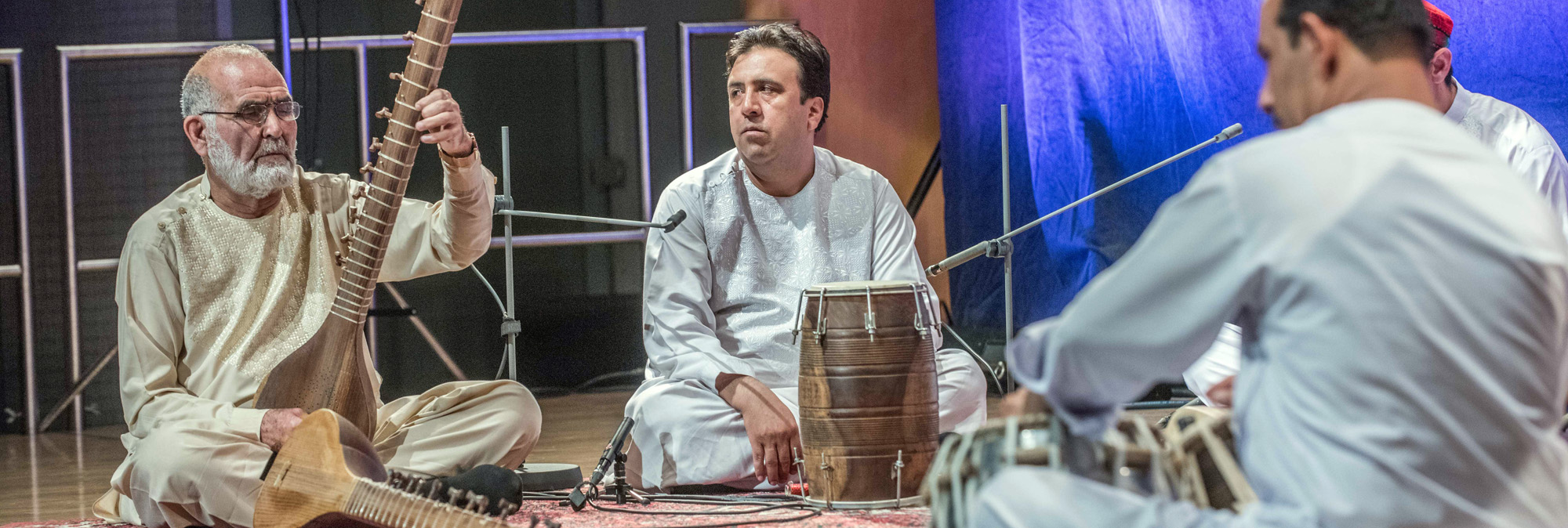Resocialization of Sound: Collaboration in Research, Archiving and Dissemination with Amazonian Collectives
Projektlaufzeit: 01.03.2024 – 31.08.2028
Context and Challenges
Decolonization debates at European ethnographic museums and their sound archives have shifted focus from just returning and restituting stored recordings to also involving collaboration with Indigenous source communities. This includes not only returning and resocializing recordings but also supporting future efforts in documenting, archiving, and outreach of indigenous music. These changes respond to the needs expressed by indigenous groups, their concepts of ownership of auditory knowledge, their views on the relationship between material and immaterial entities, and their desire for ongoing dialogue with sound archives and heritage initiatives.
The challenges presented by the return of these archives concern acknowledging the Indigenous ontologies of sound and music that they embody. From the viewpoint of indigenous experts, humans, animals, songs, natural sounds, sound carriers, and other entities form a social community. In this way, the resocialization of sound needs to take into consideration that sound is, or is connected to, a social entity and, therefore, it is part of the social life of Indigenous communities.
Research Questions
The project aims to develop a systematic understanding of how sound archives can ensure that indigenous auditory knowledge is appropriately accessed, documented, archived, and made audible within and beyond its source communities. In this sense, it addresses questions such as: How can processes for access and the technical reproducibility of indigenous auditory knowledge, as well as its circulation, be designed and made visible and audible, especially in light of current digitalization practices? How can indigenous conceptions regarding the resocialization of immaterial and material entities, and their relationships to each other, be made translatable into Western conceptions, such as "living cultural heritage"? How can indigenous performances be organized for archiving and collaborative exhibitions?
Collections, Archives, Methodology and Work Structure
These questions will be answered in a set of four interconnected work packages (archival/museum research → fieldwork → education → outreach).
The archival research involves Indigenous visits to European archives, where Indigenous specialists evaluate and investigate the recording and documentation practices of their sound performances made in the past. The project works with historical collections from the Musée d'Ethnographie de Genève (leading collection partner), the Museum der Kulturen Basel and the Ethnological Museum Berlin. The relationships of material and immaterial cultural heritage will be addressed collaboratively, taking as a point of departure the historical collections (sound recordings, objects, photos) of the Musée d'Ethnographie de Genève on the Apalai-Wayana collections, and the collection of Manfred Rauschert's recordings of the Apalai-Wayana at the University of Music Franz Liszt Weimar.
The knowledge gained in this stage will inform the fieldwork dimension of the project, which will be conducted mainly by Indigenous specialists, and help resocialize the sound archives within their communities. An educational course will be developed as part of the project, in partnership with the Federal University of Amapá (UniFap), utilizing archival material as a bridge between the young and elderly, and also creating new cultural documents that will be incorporated into the museum partners of the project for the benefit of the involved communities.
Outputs and Dissemination
The outcomes will be shared through academic articles, an exhibition at the Musée d'ethnographie de Genève opening in June 2028, a conference and its proceedings, and proposed guidelines for sound archives on the collaborative documentation, archiving, and making audible Indigenous auditory knowledge. Additional outputs include a possible parallel exhibition in Macapá (Brazil), an audio release (LP/CD) from legally cleared recordings, and an exhibition catalog or book. These results will add to ongoing discussions in music research, ethnomusicology, anthropology, and museum studies regarding ontological frameworks in studying indigenous communities and other minority musical cultures. Lastly, the requirements for sharing indigenous auditory knowledge in a European setting will be outlined.
Partnerships and Collaboration
Our research will be conducted in close collaboration with our partners from the Laboratory for the Archiving of Indigenous Sound Performances at the Federal University of Pará, Belém, Brazil ( LABETNO-UFPA) and the Associação dos Povos Indígenas Wayana e Aparai (APIWA) in Macapá and Tumucumaque Park, the Instituto de Pesquisa e Formação Indígena (Iepé), and the Sacaca Museum in Macapá.
This Swiss National Science Foundation (SNSF) funded project (Grant #220198) runs from 2023 to 2028, led by Hochschule für Musik Franz Liszt Weimar.
Projektteam:
• Prof. Dr. Matthias Lewy (Antragssteller und Koordination)
• Dr. Thiago da Costa Oliveira (Projektleiter)
• Bruno Britto (wissenschaftlicher Mitarbeiter)
• Silvino Almeida (wissenschaftliche Assistenz)
Projektpartner/innen:
• Arinaware Apalai Waiana (Präsident der Associação dos Povos Indígenas Aparai e Wayana – APIWA)
• Líliam Cristina Barros Cohen, LabEtno Instituto de Ciências da Arte - ICA Universidade Federal do Pará, Brazil
• Eliane Camargo, IPÊ Association pour le dialogue interculturelle, France
• Tiago de Oliveira Pinto, Institut für Musikwissenschaft Hochschule für Musik FRANZ LISZT Weimar, Germany
• Günther Giovannoni, Swiss National Spound Archive, Switzerland
• Natasha Amaruay Hauer Gordon (Pemón)
• Madeleine Leclair, Musée d'Ethnographie, Switzerland
• Andrea Scholz, Ethnologisches Museum im Humboldt Forum, Germany
Circulating Knowledges | 2020–2023
Circulating Knowledges | 2020–2023
Knowledge Transfer between Academia and Traditional Music Cultures in Colombia and Brazil
The aim of the project "Circulating Knowledges" is to document intangible cultural heritage as music and performance traditions in Colombia and Brazil in their historical connection to African traditions and their further development, and to communicate and research them in the local contexts. The cooperation uses new formats to transfer traditional music knowledge from the South Pacific and Caribbean regions of Colombia and the Brazilian Recôncavo da Bahia into academic formats and languages. Through the collaborative development of field-based video learning modules, teachers and students engage in a lively exchange with culture bearers and their cultural practice on the ground. This enables a synergetic circulation of different knowledge within and outside academia.
New didactic formats and video archive
The UNESCO Chair on Transcultural Music Studies at the FRANZ LISZT Weimar University of Music is coordinating the four-year project (2020–2023) with the Universidad del Valle of Cali (UdV) in Colombia and the Universidade Federal do Recôncavo da Bahia of Santo Amaro (UFRB) in Brazil. The trilateral project is part of the German Academic Exchange Service (DAAD) programme "Subject-Related Partnerships with Institutions of Higher Education in Developing Countries". The aim is to improve and expand teaching in the partner countries as well as to build structures and develop capacities at the partner universities.
Sustainable study programmes
Numerous symposia, seminars and excursions are planned within the framework of the DAAD project, as well as the establishment and expansion of archives. A four-day international conference will be organised in Weimar for the final evaluation and dissemination of the project results to a wider academic audience from Europe and abroad (2/2023).
Sponsor: German Academic Exchange Service (DAAD)
Partners: Universidad del Valle of Cali (UdV), Faculty of Music, Colombia and
Universidade Federal do Recôncavo da Bahia of Santo Amaro (UFRB), Centre for Culture, Languages and Applied Technologies, Brazil
Afghanistan Music Research Centre | 2014–2023

Das Afghanistan Music Research Centre (AMRC) wurde im Herbst 2014 am Lehrstuhl Transcultural Music Studies (TMS) am Institut für Musikwissenschaft der Hochschule für Musik FRANZ LISZT Weimar und der Friedrich-Schiller-Universität Jena gegründet.
Schwerpunkte der Arbeit sind:
- das deutsch-afghanische Konzertprojekt "Safar"
- universitäre Partnerschaften und collaborative research
- die Arbeit mit musikhistorisch bedeutenden Archiven
- die Erstellung von Lehr- und Lernmaterialien
- kulturwissenschaftliche und musiksoziologische Forschungen
Ziel der Arbeit:
Die traditionelle afghanische Musik entstand über die Jahrhunderte unter dem Einfluss verschiedener Kulturräume. Ziel des AMRC ist es, diese einzigartige Vielfalt zu dokumentieren und durch Konzerte, Vorträge und Lehrmaterial einer breiten Öffentlichkeit in Deutschland und Afghanistan zugänglich zu machen. Dabei kooperiert das AMCR mit Partnerorganisationen im In- und Ausland und wird durch das Auswärtige Amt gefördert.
Forschung
Das AMRC setzt sich im Rahmen einer Kooperation zwischen der Kabul University und der Hochschule für Musik FRANZ LISZT Weimar dafür ein, die musikwissenschaftliche Arbeit in Afghanistan nachhaltig zu stärken.
Musikpädagogik
Didaktisch aufbereites Lehrmaterial zur afghanischen Musikkultur existiert weder in Afghanistan noch in Deutschland. Das AMRC bereitet daher musikethnologische Inhalte für allgemeinbildende Schulen auf.
Archive
Technologische Entwicklungen im Bereich der digitalen Speichersysteme eröffnen neue Möglichkeiten der Archivierung und der wissenschaftlichen Zusammenarbeit.
Seit Oktober 2022 sind die Stipendiaten Mohsen Saifi, Mohammad Naseem Fazel
und Mohammad Sediq Zarifyar als Experten im AMRC tätig.
Applied Musicology – Jewish and Arabic Music | 2020–2021
Caravan Orchestra
A core objective of the research project "Applied Musicology - Jewish and Arabic Music" is to make transcultural processes visible by means of a common repertoire of Jewish, Ottoman and Arabic music and its application in the project "Caravan Orchestra & Choir".
The Caravan project will be funded by the Thuringian Ministry of Science in 2020 and 2021 because of its accompanying scientific programme designed for artistic sustainability. At the same time, musical cultural heritage is being created here, with Thuringia as its venue and dissemination centre.
Preservation and digitisation
In addition, a digital archive of the music of the Caravan Orchestra (Yiddish Summer Weimar) will be created in connection with the digitisation strategy of the state of Thuringia. The securing and recording of the metadata of the film and sound recordings is intended to make them accessible not only for the benefit of the university and its artistic and pedagogical courses of study, but also for musicology in general, Jewish studies, Arabic studies and related disciplines such as German studies, history and ethnology.
Jewish life and Jewish heritage in Thuringia
In the Thuringian theme year 2021 "Nine centuries of Jewish life in Thuringia", the Caravan Orchestra project will be given new opportunities to perform in the Free State and also nationwide. Furthermore, workshops and lectures are planned, which in addition and in close coordination with the Chair of the History of Jewish Music will become the subject of courses at the university.
Sponsor: Thuringian Ministry of Economy, Science and Digital Society
Partner: University of Haifa, School of Music, Haifa (Israel)
Prof. Dr. Tiago de Oliveira Pinto reports in the LISZT Magazine on "The Caravan Orchestra as a cooperation with Haifa University and the Yiddish Summer Weimar".
LISZT Magazine (N° 17, April 2020), article "Building Bridges", p. 56–57
:::To the article::: (in German)
Musikarchiv des RTA | 2018
Musikarchiv des RTA | 2018
Ziel des vom Auswärtigen Amtes geförderten Projekts ist die Bewahrung des Musikarchivs des Radio Television Afghanistan (RTA) in Kabul.
Die seit dem Projekt „Safar“ (2012–2016) bestehende Kooperation zwischen dem Afghanistan Music Research Centre (AMRC) und dem Radio Television Afghanistan (RTA) soll die Öffnung, Zugänglichmachung und Sicherung der noch bestehenden größten und kulturell sehr wertvollen Sammlung RTAs aus der Blütezeit afghanischer Musik für Wissenschaft und Forschung bewirken.
Sicherung und Digitalisierung des Musikarchivs
Systematisches Archivieren und Bereitstellen von den noch wenigen vorhandenen Sammlungen bietet der afghanischen Bevölkerung einen Zugang zu Aspekten der eigenen Identität, die über Generationen hinweg ein zentraler Bestandteil ihres kulturellen Gedächtnisses waren. Archivarische Vorhaben können zu einer wichtigen Stütze einer Zivilgesellschaft werden. Sie stellen ein wichtiges Kulturerbe Afghanistans dar, welches aber aufgrund der Sicherheitslage in Afghanistan stets gefährdet ist.
Digitalisierung und Erfassung der Metadaten
2016 unterzeichneten die Hochschule für Musik FRANZ LISZT Weimar und der Sender RTA ein „Memorandum of Understanding“ zur Archivzusammenarbeit. Das AMRC unterstützt die RTA-Partner bei der Digitalisierung und Erfassung der Metadaten der Archivalien des Musikarchivs, welche nachfolgend auf der DISMARC-Datenbank (DIScovering Music ARChives) für Forschung und Wissenschaft zugänglich gemacht werden. Eines der Projektziele in 2018 war die Optimierung und Verfeinerung der Metadaten-Tabelle für das RTA Musikarchiv auf einen internationalen Standard (basierend auf dem „Dublin Core Extended“).
Träger: Auswärtiges Amt und Botschaft der Bundesrepublik Deutschland Kabul
Partner: Afghanistan National Institute of Music (ANIM), Kabul (Afghanistan)
Förderer:siehe Auflistung
Film documentary "GUZO – The search for the origins of Ethiopian Music" (10 min)
Project idea: Samuel Yirga
Scientific supervision: Prof. Dr Tiago de Oliveira Pinto
Film production: Dirk van den Berg
Film documentary "GUZO North" (30 min)
Director: Dirk van den Berg
Camera: Henrik Sauer BVK, Olivia Furtwängler
Editing: Johanna Fastenau, Dirk van den Berg
Production: André Helfers
Production assistance: Julie Pageler
Production: OutreMer Film GBR

